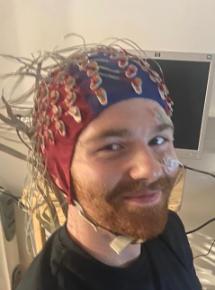Students can take modules in Psychology (Clinical cases in neuropsychology, embodied and social cognitive neuroscience, neuro-disability & rehabilitation, visual and social cognition and cognitive psychology) and Neuroscience (principles of neuroscience, higher cortical function, sensory neuroscience) allowing them to customise their postgraduate education to complement their undergraduate training.
One Year Full Time
Programme Directors
Associate Professor Nuala Brady, Assistant Professor Sarah Cooney
For general enquiries, please contact Mary Boyle ((opens in a new window)mary.boyle@ucd.ie).
| The MSc in Behavioural Neuroscience offers advanced education and training in topics concerning human behaviour and its relation to the brain. Students will gain key skills in research methods, experimental design, statistics & data analysis. This is achieved through lab rotation and by pairing students with academic supervisors based on their research interests to complete a 30-credit research project. |
 |
|---|
| Andrew Roe
|
My time completing my MSc in Behavioural Neuroscience at UCD was the perfect stepping stone after my BSc in Psychology at DCU, building upon my background in areas like neuropsychology and biopsychology. The course content gave me a clearer understanding of the brain’s relationship to behaviour while also developing my practical skills, from eye tracking and EEG to virtual reality and neuropsychological assessment. The modules were engaging, the lecturers were excellent, and Brightspace made everything seamless in terms of communication and organisation. |
| Cameron McCabe
|
The MSc in Behavioural Neuroscience at UCD is an amazing postgraduate programme for anyone interested in pursing a career in psychology or neuroscience research. Over the course of one year, I gained hands-on experience with eye-tracking, EEG, and TMS; something very few other programmes can offer. Modules such as 'Embodied & Social-Cognitive Neuroscience', 'Recent Papers in Psychology', and 'Advanced Data Analysis and Statistics in R' provide opportunities to really push your understanding of psychological research beyond undergraduate level. My MSc thesis investigating the causal role of brain regions in Theory of Mind processing using TMS is now being edited for publication in a major neuroscience journal and I am now conducting a PhD at UCD and Trinity College Dublin with the same supervisor from the MSc. I would recommend this programme to anyone wishing to bridge their knowledge gap between psychology and neuroscience (in any direction) and to anyone wishing to use this knowledge for a career in research.... |
|
|
... I had an amazing experience on the MSc in Behavioural Neuroscience at UCD. From the very beginning, the class formed a supportive community that made the course especially enjoyable, and we really helped each other to succeed. I was honoured to be class rep and found the lecturers were always approachable and willing to provide support. My favourite module was Clinical Cases in Neuropsychology, as it provided a chance to learn from real case studies and seminars delivered by Clinical Psychologists. I also loved the practical lab sessions, which gave me hands-on experience with methods such as eye-tracking and EEG that will benefit me in future roles. A particular highlight was being part of the UCD BabyLab, where I gained valuable research experience under the guidance of my supervisor. I am delighted that the experience has led to the opportunity to continue contributing to the lab to further my interest in research. Overall, the programme has strengthened my skills and solidified my passion for neuropsychology, and I would recommend it to anyone interested in pursuing a career in clinical psychology or research. |
| Shannon Rosbotham
|
Overall, completing the MSc in Behavioural Neuroscience was an incredibly valuable experience. After finishing my BSc in Psychology at Queen’s University Belfast, I was looking for a Master’s course with a strong emphasis on neuropsychology, and the MScBN delivered exactly that. Modules such as Clinical Cases in Neuropsychology, Fundamentals of Neuropsychology, and Principles of Neuroscience significantly deepened my understanding of the neuroscientific field. The course also gave me the opportunity to work with advanced equipment I had not used before, including EEG, TMS, eye-tracking, and other physiological recording tools. For my research project, I investigated individuals’ heart rate variability and skin conductance. Although learning to use this equipment was often challenging, the support I received from my supervisors and the IT team made the process much smoother and in the end, it became the highlight of my MSc experience. Since completing the MSc, I have returned to UCD to pursue my PhD, where I will continue to build upon the skills and knowledge I developed during this time. |
| Sarah Moran
|
I thoroughly enjoyed the MSc Behavioural Neuroscience programme. Coming from a BA in Neuroscience that focused mostly on neurobiology and very little on cognitive neuroscience and psychology, the MScBN programme afforded me the opportunity to take modules in these areas and expand my knowledge of these fields greatly. There are also many neuroscience modules offered for those interested in learning more about that area. During my research project, I collected data using the brand-new EEG system and received incredible support from my supervisors during this, in the subsequent analysis of this data, and in writing my thesis. All of the coordinators and lecturers on the MScBN programme are also extremely supportive and always willing to help if you have any queries or concerns. After graduation, I worked as a research assistant for a while and have now started my PhD at the UCD School of Psychology, and I continue to use the skills and knowledge acquired during my MSc. I would highly recommend this programme to anyone interested in a career in cognitive neuroscience or psychology research. |
| Finn Brady
|
My time spent on the MSc in Behavioural Neuroscience in UCD was invaluable, between the skills that I acquired, the theories I learned and the friendships that I made. Coming from a BA in Psychology at National University of Ireland Galway, I was seeking a postgraduate course with an emphasis on research over clinical work. This course suited my preferences perfectly, with a litany of research-oriented modules and extensive cognitive and neuroscientific experiments offered as thesis options. The Embodied and Social Cognition, Recent Papers in Psychology and Laboratory modules provided me with extensive knowledge and confidence in moving forward towards a career in research. My thesis on the interaction between interoception and the body schema, which required the purchasing of equipment and extensive assistance from the Psychology IT department was fully supported by my supervisors and is currently being edited for publication in a major journal. Since graduation I have stayed on in UCD as a PhD researcher in the School of Psychology. Now, I’m putting my skills learned during the programme, like designing experimental paradigms and EEG analysis to use. I would highly recommend the course if you want to move forward in a psychology or neuroscience research career. |
| Clara Stein
|
The MSc in Behavioural Neuroscience presented itself as an ideal opportunity to transition from my undergraduate degree at University of Edinburgh to a PhD at University College Dublin. I acquired relevant knowledge and important skills in modules such as Principles of Neuroscience and Clinical Cases in Neuropsychology, as well as in hands-on EEG, eye tracking, and virtual reality labs. Most importantly, I had incredibly supportive supervisors and a great research project. I am delighted and honoured to build on my MSc research as an Irish Research Council Government of Ireland Scholar and PhD researcher in the School of Psychology, UCD. |
| Nora King
|
|
| Anna Igoe
|
I thoroughly enjoyed my time as a student on the MSc BN. From an academic standpoint some of the highlights for me included the behavioural neuroscience seminars, the clinical neuropsychology lectures and of course the research project/thesis. In these, academics and clinicians spoke of their diverse areas of specialty and research endeavours, which inspired me to continue contributing to research and ultimately to pursue a career in neuropsychology. Since graduating I have been working with the HSE as an Assistant Psychologist and I hope to go on to complete a Doctorate in Clinical Psychology in the future. I believe the knowledge I gained from the MSc BN programme has been and will continue to be valuable in my future career. |
| Declan Quinn
|
The MSc program in Behavioural Neuroscience was highly valuable in that it allowed me to explore topics at the intersection of psychology and neuroscience that I touched upon briefly in my undergraduate degree through a varied range of modules. For me, a particular strength of the course was the excellent support I received from my supervisors during my research project, with the small ratio of students to faculty enabling supervisors to be easily contactable. It also ensured that lots of time could be spent ironing out any kinks in research design or statistical analysis! I thoroughly enjoyed both laboratory modules as their varied nature allowed me to sample a range of different research techniques in the behavioural and cognitive neurosciences such as eye-tracking and EEG. While a wholly worthwhile course for anyone interested in progressing towards a career in clinical psychology, the MSc Behavioural Neuroscience offers a huge amount for those of a purely experimental disposition such as myself, equipping me with many of the skills required for a career in research, and has been advantageous in the search for a role as a research assistant. Declan is now enrolled in the PhD programme in Psychiatry at Trinity College Dublin |
| NAME | ... |
The program provides an excellent preparation for students who wish to pursue doctoral research in psychology, neuroscience or neuropsychology and equips students for work in research, medical and health settings.
The School of Psychology has laboratories dedicated to the study of Attention & Memory, Perception, Neuropsychology, Eye Tracking, Brain Imaging (including EEG, TMS), and Media and Entertainment Psychology, and the School has research links with Trinity College Institute of Neuroscience, St Vincent’s Hospital and the Centre for Neuroimaging, Cognition and Genomics (NUIG).
Each year, the Behavioural Neuroscience Medal recognises the best student in the Masters in Behavioural Neuroscience. The award will be presented at the annual School of Psychology awards ceremony (usually held in December of the following academic year).
All students in the Masters in Behavioural Neuroscience are eligible for this award.
The award will be presented to an outstanding student who performs at the top of their class, reflected by the highest GPA gained that year. In the case of a tie, the student with the highest grade in their research project will receive this award.
Below you can read some questions that prospective applicants have asked us and our answers. If your own query has not been answered already, please drop Mary an email at (opens in a new window)mary.boyle@ucd.ie
General Questions
Where will this programme lead? Does it provide a suitable background for a career in clinical psychology, in neuropsychology?
You are likely aware that any Masters programme is a stepping stone to a future, and that in the case of becoming a professional - in Clinical Psychology or in Clinical Neuropsychology - there is considerable further training, study and practice required. An understanding of research methods, of the neural basis of behaviour and cognition, and of the testing methods psychologists use are all very useful background for a professional career in psychology. The MSc Behavioural Neuroscience programme offers this plus hands-on research training working on a research project with members of academic staff. Have a look at the Student Testimonials on our website to see what directions some of our graduates are headed in.
Do I need to be a member of the Psychological Society of Ireland (PSI)?
We do not require PSI graduate membership from our applicants. While many students with a primary degree in Psychology from an Irish university will be a member of PSI, we hope to attract students from diverse backgrounds, including Psychology, Neuroscience and Cognitive Science, and from both Ireland and abroad. We are building links with Neuroscience Ireland (opens in a new window)https://neuroscienceireland.com/and hope to introduce a Behavioural Neuroscience student conference in time for students of this Masters programme.
How many people will be accepted to the masters?
We aim to cap at 20 students for the next academic year, maintaining a small student-staff ratio for laboratory-based research.
Questions about Modules
Behavioural Neuroscience Methodology. Is this a laboratory- based module?
Yes, there are two laboratory-based modules. Trimester 1 focuses on behavioural methods and will include laboratories in Eye tracking, Virtual Reality and in Neuropsychology (via a Neuropsychological Case Study). Trimester 2 focuses on the biological/physiological basis of behaviour and includes a hands-on lab on EEG/ERP and theoretical background to MEG. Students will learn how to use equipment, manage, visualise and analyse data. Find out more about the laboratory equipment available to students in the PDF of MNC lab equipment
Knowledge Transfer. What is this module about?
This is about dissemination of research findings, a key skill in research. Students will learn how to communicate research findings (a) to a lay audience by writing a 'popular science' article on their research project and (b) to a professional audience by making a conference style oral presentation of their project work
Clinical Cases in Neuropsychology. Will this module include discussion of disorders e.g., agnosia etc?
Yes, various aspects of Neuropsychology will be covered by considering clinical cases. This module will be co-taught by Professor Jessica Bramham (UCD Psychology) who is a clinical psychologist specialising in ADHD, ASD (she is the research coordinator for our Clinical Psychology programme) and Professor Fiadhnait O Keefe who works as a Neuropsychologist at St Vincent's Hospital and who is an adjunct member of academic staff at UCD. Lectures are delivered by neuropsychologists/ clinicians.
Questions about Modules & Credits
How many credits are core and how many are options?
This is a 90-credit programme comprise 60 credits from core modules that are compulsory on the programme and 30 credits from options modules. Have a look at to see exactly how the credit system works
Is there true flexibility for choosing which modules you are interested in, as I know from experience that sometimes when it comes to the start of the trimester, some modules are no longer running or you have less choice than stated.
All of the modules which are listed as available on the SIS Website will be available when you enrol. The University require that all programmes are designed and structured in advance so that the information provided to prospective students is accurate.
Do you need to take a certain number of modules in each trimester?
UCD regulations on student workload specify that a programme cannot require a student to take more than 30 credits per trimester and a further stipulation that a student cannot take more than 40 per trimester (this allows students to carry work they are remediating or to simply take extra modules that interest them in a specific trimester). The structure of this programme is the standard used in Masters programmes at UCD and you can read about it in detail in the
Will we need to prepare a research proposal in advance of the masters, or will we be provided with a list of potential projects we can join?
All projects are by 'internship'; students will be given a list of potential projects and can rank project preferences. We will try match you with the closest preference. The idea is to have students working under close supervision on a publishable piece of research. Have a look at the projects on offer this year (which you can access at the Detailed Documents link). While offerings will vary from year to year, this will give you an idea of staff research interests. You can also browse the School of Psychology website to find out about our research interests and ongoing work
Full course details and application at
https://hub.ucd.ie/usis/!W_HU_MENU.P_PUBLISH?p_tag=PROG&MAJR=W461









